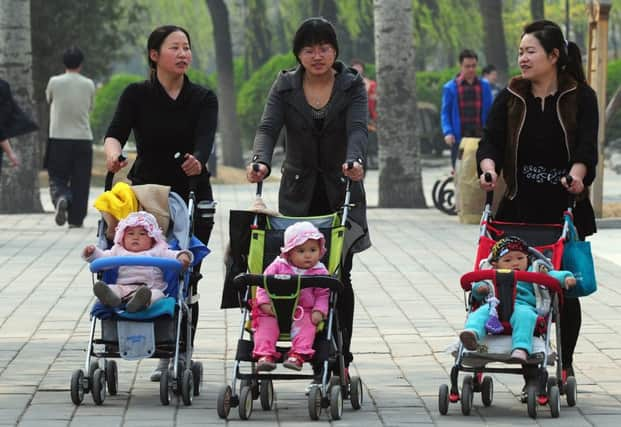China decides to ditch one child per family rule


The decision is the most significant easing of family planning policies that were long considered some of the party’s most onerous intrusions into family life. The restrictions led to an imbalanced sex ratio because of a traditional preference for boys, and draconian enforcement that sometimes included forced abortions.
A communique from the party’s central committee carried on the official Xinhua News Agency said that the decision to allow all couples to have two children was “to improve the balanced development of population” and to deal with an ageing population.
Advertisement
Hide AdAdvertisement
Hide AdThe move may not spur a huge baby boom in part because fertility rates are believed to be declining even without the policy’s enforcement. Previous easings of the policy have spurred fewer births than expected, and many people among China’s younger generations see smaller family sizes as ideal.
The communique followed the panel’s meeting this week to chart the country’s economic and social development through 2020. In recent years, it has been unusual for such plenary sessions to result in major decisions. They generally focus on economic topics and there was no indication that this one would take action on the one-child policy.
China, which has the world’s largest population at 1.4 billion people, introduced the one-child policy in 1979 as a temporary measure to curb a then-surging population and limit the demands for water and other resources. Soon after it was implemented, rural couples were allowed two children if their firstborn was a girl. Ethnic minorities are also allowed more than one child.
Chinese families with a strong preference for boys have sometimes resorted to aborting female fetuses, a practice which has upset the ratio of male to female babies. The imbalance makes it difficult for some men to find wives, and is believed to fuel the trafficking of women as brides.
Couples who have broken the rules were forced to pay a fee in proportion to their income. In some cases, rural families saw their livelihood in the form of their pigs and chickens taken away.
In November 2013, the party announced it would allow couples to have two children if one of the parents is a single child, the first substantial easing of the policy in nearly three decades.
The decision removes all remaining restrictions limiting couples to only one child.